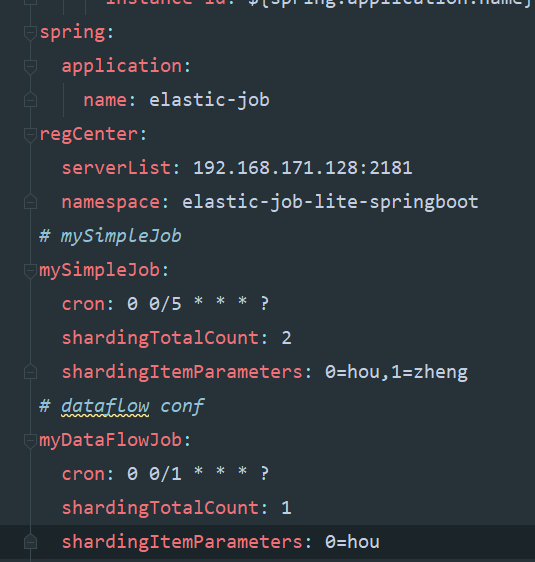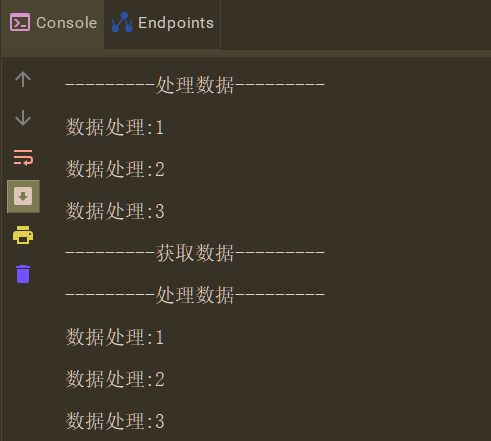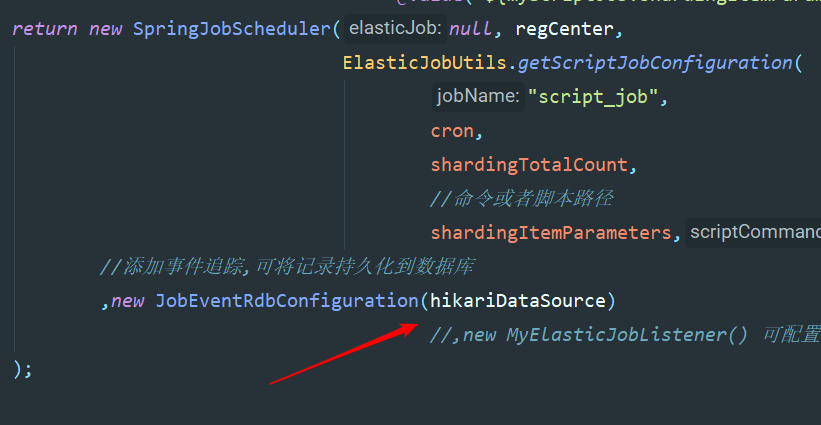一 springboot整合
介绍就不多说了,只有这个框架是当当网开源的,支持分布式调度,分布式系统中非常合适(两个服务同时跑不会重复,并且可灵活配置分开分批处理数据,贼方便)!
这里主要还是用到zookeeper,如果没有zk环境,可以百度或者参考我之前的博客搭建
添加依赖,这里有一点,如果是在springcloud中的话,需要排除自带的curator依赖,因为cloud已经集成一些,会冲突:

1 <!-- elastic-job --> 2 <dependency> 3 <groupId>com.dangdang</groupId> 4 <artifactId>elastic-job-lite-core</artifactId> 5 <version>2.1.5</version> 6 <exclusions> 7 <exclusion> 8 <artifactId>curator-client</artifactId> 9 <groupId>org.apache.curator</groupId> 10 </exclusion> 11 <exclusion> 12 <artifactId>curator-framework</artifactId> 13 <groupId>org.apache.curator</groupId> 14 </exclusion> 15 <exclusion> 16 <artifactId>curator-recipes</artifactId> 17 <groupId>org.apache.curator</groupId> 18 </exclusion> 19 </exclusions> 20 </dependency> 21 <dependency> 22 <groupId>com.dangdang</groupId> 23 <artifactId>elastic-job-lite-spring</artifactId> 24 <version>2.1.5</version> 25 </dependency> 26 <dependency> 27 <groupId>org.apache.curator</groupId> 28 <artifactId>curator-framework</artifactId> 29 <version>2.10.0</version> 30 </dependency> 31 <dependency> 32 <groupId>org.apache.curator</groupId> 33 <artifactId>curator-client</artifactId> 34 <version>2.10.0</version> 35 </dependency> 36 <dependency> 37 <groupId>org.apache.curator</groupId> 38 <artifactId>curator-recipes</artifactId> 39 <version>2.10.0</version> 40 </dependency> 41 </dependencies>
然后就是配置zk注册中心,分布式功能主要依赖这个,所有属性都从yml中注入,这里注意一点,可以把超时时间设置大一点:
@Configuration
public class ElasticRegCenterConfig {
/**
* 配置zookeeper注册中心
*/
@Bean(initMethod = "init") // 需要配置init执行初始化逻辑
public ZookeeperRegistryCenter regCenter(
@Value("${regCenter.serverList}") final String serverList,
@Value("${regCenter.namespace}") final String namespace) {
ZookeeperConfiguration zookeeperConfiguration = new ZookeeperConfiguration(serverList, namespace);
zookeeperConfiguration.setMaxRetries(3); //设置重试次数,可设置其他属性
zookeeperConfiguration.setSessionTimeoutMilliseconds(500000); //设置会话超时时间,尽量大一点,否则项目无法正常启动
return new ZookeeperRegistryCenter(zookeeperConfiguration);
}
}
然后就是配置job了,其实和spring的quartz配置都差不多,一个job类,一个调度类
这里先贴我的yml配置,任务执行周期,分片个数都从这里注入即可,分片使用后面单独说明:

二 simplejob
job类:
@Component
public class MySimpleJob implements SimpleJob {
@Override
public void execute(ShardingContext shardingContext) {
System.out.println(shardingContext.getJobName()+"执行:"+
"分片参数:"+shardingContext.getShardingParameter()+
",当前分片项:"+shardingContext.getShardingItem()+
",time:"+ LocalDate.now());
}
}
配置类,这里用到了一个工具方法,工具类放下面:
/**
* 配置MySimpleJob
*/
@Configuration
public class MySimpleJobConf {
@Autowired ZookeeperRegistryCenter regCenter;
@Autowired MySimpleJob mySimpleJob;
/**
* 配置任务调度: 参数: 任务
* zk注册中心
* 任务详情
*/
@Bean(initMethod = "init")
public JobScheduler simpleJobScheduler(@Value("${mySimpleJob.cron}") final String cron, //yml注入
@Value("${mySimpleJob.shardingTotalCount}") final int shardingTotalCount,
@Value("${mySimpleJob.shardingItemParameters}") final String shardingItemParameters) {
return new SpringJobScheduler(mySimpleJob, regCenter,
ElasticJobUtils.getSimpleJobConfiguration(
mySimpleJob.getClass(),
cron,
shardingTotalCount,
shardingItemParameters)
//,new MyElasticJobListener() 可配置监听器
);
}
}
工具类:

public class ElasticJobUtils {
/**
* 创建简单任务详细信息
*/
public static LiteJobConfiguration getSimpleJobConfiguration(final Class<? extends SimpleJob> jobClass, //任务类
final String cron, // 运行周期配置
final int shardingTotalCount, //分片个数
final String shardingItemParameters) { // 分片参数
return LiteJobConfiguration.newBuilder(new SimpleJobConfiguration(
JobCoreConfiguration.newBuilder(jobClass.getName(), cron, shardingTotalCount)
.shardingItemParameters(shardingItemParameters).build()
, jobClass.getCanonicalName())
).overwrite(true).build();
}
/**
* 创建流式作业配置
*/
public static LiteJobConfiguration getDataFlowJobConfiguration(final Class<? extends DataflowJob> jobClass, //任务类
final String cron, // 运行周期配置
final int shardingTotalCount, //分片个数
final String shardingItemParameters,
final Boolean streamingProcess //是否是流式作业
) { // 分片参数
return LiteJobConfiguration.newBuilder(new DataflowJobConfiguration(
JobCoreConfiguration.newBuilder(jobClass.getName(), cron, shardingTotalCount)
.shardingItemParameters(shardingItemParameters).build()
// true为流式作业,除非fetchData返回数据为null或者size为0,否则会一直执行
// false 非流式,只会按配置时间执行一次
, jobClass.getCanonicalName(),streamingProcess)
).overwrite(true).build();
}
}
测试:

三 dataflowjob
job类:
@Component
public class MyDataFlowJob implements DataflowJob<String> {
@Override
public List<String> fetchData(ShardingContext shardingContext) { //抓取数据
System.out.println("---------获取数据---------");
return Arrays.asList("1","2","3");
}
@Override
public void processData(ShardingContext shardingContext, List<String> list) {//处理数据
System.out.println("---------处理数据---------");
list.forEach(x-> System.out.println("数据处理:"+x));
}
}
配置类:
@Configuration
public class MyDataFlowJobConf {
@Autowired ZookeeperRegistryCenter regCenter;
@Autowired MyDataFlowJob myDataFlowJob;
/**
* 配置任务调度: 参数: 任务
* zk注册中心
* 任务详情
*/
@Bean(initMethod = "init")
public JobScheduler dataFlowJobScheduler(@Value("${myDataFlowJob.cron}") final String cron, //yml注入
@Value("${myDataFlowJob.shardingTotalCount}") final int shardingTotalCount,
@Value("${myDataFlowJob.shardingItemParameters}") final String shardingItemParameters) {
return new SpringJobScheduler(myDataFlowJob, regCenter,
ElasticJobUtils.getDataFlowJobConfiguration(
myDataFlowJob.getClass(),
cron,
shardingTotalCount,
shardingItemParameters,true)
//,new MyElasticJobListener() 可配置监听器
);
}
}
测试:

需要注意一点流式作业如果数据不为空会一直跑
四 scriptjob
脚本任务有一点,不需要创建类实例,否则会报错,参数直接传null即可
配置类:
@Configuration public class MyScriptJobConf { @Autowired ZookeeperRegistryCenter regCenter; /** * 配置任务调度: 参数: 任务 * zk注册中心 * 任务详情 */ @Bean(initMethod = "init") public JobScheduler scriptJobScheduler(@Value("${myScriptJob.cron}") final String cron, //yml注入 @Value("${myScriptJob.shardingTotalCount}") final int shardingTotalCount, @Value("${myScriptJob.shardingItemParameters}") final String shardingItemParameters) { return new SpringJobScheduler(null, regCenter, ElasticJobUtils.getScriptJobConfiguration( "script_job", cron, shardingTotalCount, //命令或者脚本路径 shardingItemParameters,"echo hello") //,new MyElasticJobListener() 可配置监听器 ); } }
工具添加静态方法:
/** * 创建脚本作业配置 */ public static LiteJobConfiguration getScriptJobConfiguration(final String jobName, //任务名字 final String cron, // 运行周期配置 final int shardingTotalCount, //分片个数 final String shardingItemParameters, final String scriptCommandLine //是脚本路径或者命令 ) { // 分片参数 return LiteJobConfiguration.newBuilder(new ScriptJobConfiguration( JobCoreConfiguration.newBuilder(jobName, cron, shardingTotalCount) .shardingItemParameters(shardingItemParameters).build() // 此处配置文件路径或者执行命令 , scriptCommandLine) ).overwrite(true).build(); }
测试:

五 分片用法
分片的目的就是通过配置分片个数,让不同的分片参数到不同的服务中去,比如配置了分片个数是2,那么分片一会到服务一中,分片二到服务二中
项目中根据分片参数来决定哪个服务处理哪些数据,比如 0=客户甲,1=客户乙,但是分片item是从1开始
分片算法默认是平均,可自定义,然后参数就是上面yml那种配置,比如2,就是 0=,1= 4就是0=,1=,2=,3=,两个服务的话服务一就是0,1的参数,服务二就是2,3的参数,并且分片item是3,4
然后要注意一点的是,这个分片识别是根据ip的,也就是说同一台电脑,跑两个程序没用,两个程序都会全部执行,还是会重复
主要是这个分片保证分布式中处理数据不重复,分片也会转移,即一个服务挂了之后,分片参数和item会自动转移到剩下服务中
六 事件追踪(即任务信息持久化到mysql)
需要提前创建btach_log数据库
配置数据源Bean,在任务配置中添加event
@Configuration @ConfigurationProperties(prefix = "spring.datasource") public class JobDataSourceConf { private String url; private String username; private String password; private String driver_class_name; @Bean @Primary public DataSource hikariDataSource() { HikariDataSource dataSource = new HikariDataSource(); dataSource.setJdbcUrl(url); dataSource.setUsername(username); dataSource.setPassword(password); dataSource.setDriverClassName(driver_class_name); return dataSource; }

程序会自动创建两张表并添加记录

七 容易踩的坑
一 配置类中配置bean的时候,方法名不要重复,否则会发现任务不跑,
二 测试分布式的时候,必须跑在ip不一样的服务上,否则不会实现分片
三 我的版本再pom里面,springboot版本是2.0.6,版本不一样可能用法也有些区别
四 理论上xml更简单,但是我个人比较喜欢代码风格,哈哈
五 脚本任务不能新建实例,参数传null,且确认命令是否有权限
